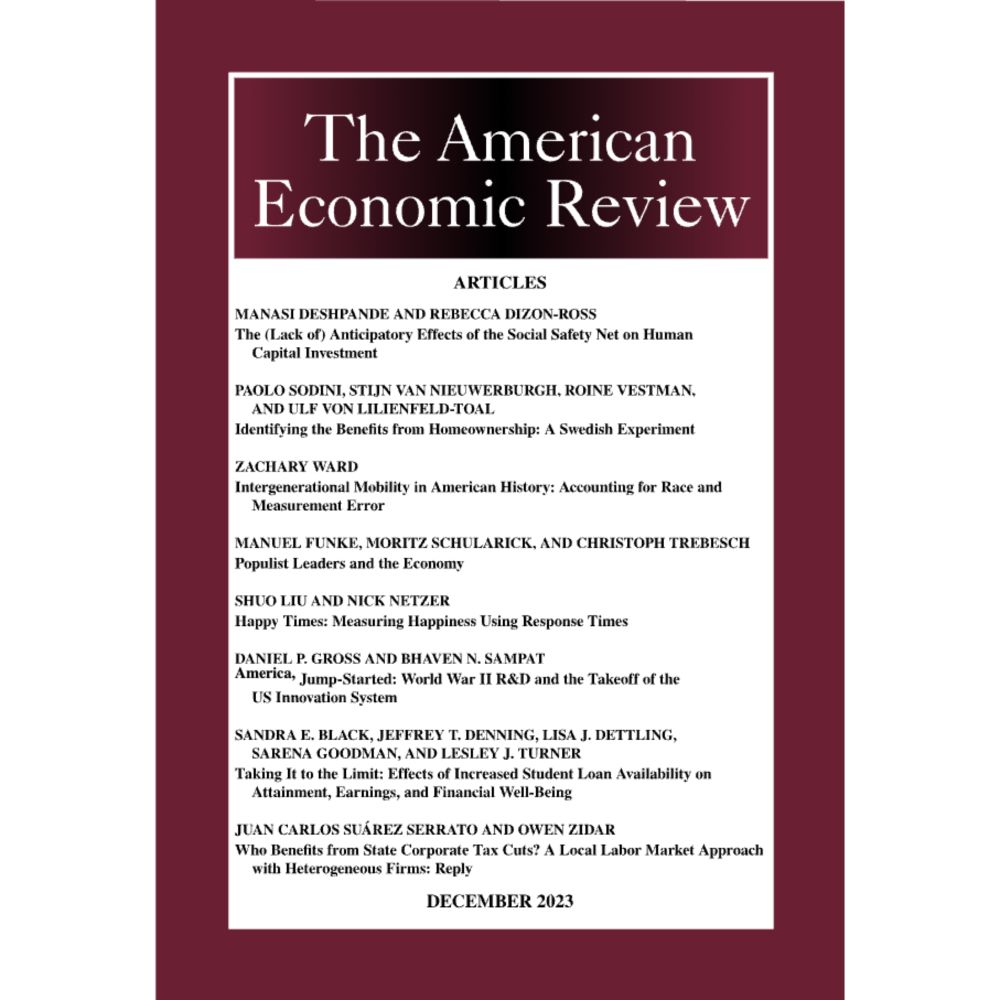
Join us on Thursday, 29 January, at *13:30 CET for the International Roundtable on Computational Social Science with
Bedoor AlShebli (NYU Abu Dhabi)
🔹 The Science of Science... and its Human Side 🔹 More info: liu.se/en/event/int...
@selcanmutgan.bsky.social
Assistant Professor @ Institute for Analytical Sociology, Linköping U. | Dynamics of segregation selcanmutgan.com

Join us on Thursday, 29 January, at *13:30 CET for the International Roundtable on Computational Social Science with
Bedoor AlShebli (NYU Abu Dhabi)
🔹 The Science of Science... and its Human Side 🔹 More info: liu.se/en/event/int...

Markets and Mobility: How Employers Structure Economic Opportunity

Intergenerational mobility, measuring the ability to achieve economic success regardless of family background, is a critical reflection of a society’s commitment to equality of opportunity. Rising income inequality has raised concerns about the potential erosion of upward mobility. While education has traditionally been viewed as the path to mobility, its transformative power is facing challenges in a rapidly evolving job market. This project reorients the focus of intergenerational mobility research by highlighting the labor market as an arena for the reproduction of advantage. It employs a comparative approach, using administrative data from four countries: Sweden, Austria, England, and the United States. It also incorporates evidence from a broader set of nations through cross-national surveys, longitudinal household surveys, labor force surveys, secondary data, and digital trace data. The project employs cutting-edge empirical methods, including quasi- experimental designs, event studies, within-family comparisons, decomposition analyses, counterfactual simulations, and diagnostic checks to rigorously assess the extent of inequalities in the labor market. The research investigates how family background influences the sorting of individuals to employers and workplaces, accounting for education and occupation, and explores variations in career progression within and between employers. It comprehensively catalogues and assesses mechanisms shaping workplace inequality, contributing to the development of social closure theory. Additionally, the project evaluates intervention strategies, encompassing both employer practices and government actions, to promote fair opportunity in the labor market.
JOB! I'm hiring a postdoc for 2 years on my ERC MaMo project.
Looking for someone with strong quant methods, ongoing work close to the project's aims, and a desire to publish in sociology. Start flexible in the next 12 months.
Formal call out shortly, but contact me first.

Now out in Sociological Science
(How) do sociologists use GenAI for their research? Find out in our paper.
Written with @ajalvero.bsky.social @dustinstoltz.com and Marshall Taylor. Thank you to everyone who participated in the survey!!

✨ We’re excited to announce the Spring 2026 IAS Seminar Series, featuring a stellar lineup of speakers and thought-provoking talks. Open to all! #AcademicSky
19.01.2026 10:42 — 👍 38 🔁 26 💬 1 📌 0The Women’s Forum will meet on July 1st in the afternoon and will host flash talks for junior scholars as well as a panel on women in academia. We hope to see you there!
13.01.2026 15:53 — 👍 4 🔁 4 💬 0 📌 0(How) do sociologists use GenAI for their research? Find out in our new preprint.
Written with @ajalvero.bsky.social @dustinstoltz.com and Marshall Taylor. Thank you to everyone who participated in the survey!

The 8th European Conference on Social Networks (EUSN 2026) will take place on 11-15 August 2026 in Norrköping, Sweden, hosted by @iasliu.bsky.social
⌛ Deadline for workshop and session proposals: 1 December 2025
More information: liu.se/en/event/eus...

Front cover of The Division of Rationalized Labor. The cover includes four pictures: pen and paper, microscope, factory tower, police badge. Modern-looking yellow lines and graphs are superimposed.
My new book, The Division of Rationalized Labor, is now shipping! A brief summary of the argument to follow…
26.11.2025 17:45 — 👍 104 🔁 43 💬 8 📌 6A long time in the making!
This literature review aims to:
1/ illuminate the (multi-)causal connection between economic inequality and economic segregation in the current (segmented) literature(s);
2/ foster the use of up-to-date comparable indices;
...
We will study how exposure to different socioeconomic and ethnic groups in different domains of life—neighborhoods, schools, and workplaces—shapes segregation and inequality over the life course and across generations.
20.11.2025 22:15 — 👍 6 🔁 0 💬 0 📌 0I'm happy to share that our team (@lecoursonnais.bsky.social, Maria Brandén, @martinhallsten.bsky.social and myself) has received 6.8M SEK in funding from the Swedish Research Council for our project: “Paths of Inequality: Life-Course Segregation Across Multiple Domains.”
20.11.2025 22:11 — 👍 28 🔁 3 💬 2 📌 1
Visas are a key tool for states to regulate incoming mobility from abroad, which can have ramifications for the establishment and perpetuation of global inequalities. In this article, we systematically analyze visa appointment wait times in German embassies and consulates worldwide. Using computational methods, we collect—and publish—fine-grained longitudinal data on the closest available appointment dates for various visa types, covering a total of 16,182 visa appointment requests. Our analysis reveals strong and systematic variance: the poorer the country a diplomatic mission is based in, the longer the wait time and the lower the chances of finding an available appointment (which ranges from almost 0 to 100 percent). We also argue that Germany’s system is quite opaque compared to other established immigration countries such as the U.S. These core findings raise important questions in light of current debates about global justice, legal pathways to migration, and efforts to attract foreign talent.

Graph that shows that 44.1 percent of requests did not lead to an appointment that could be selected. For the 55.9 percent where an appointment was available the distribution of wait times follows a steep curve with short wait times in many cases and a long tail of few cases with very long wait times of up to 98 days.

The average wait times and chances to find an appointment varied a lot between Germany's diplomatic missions. The latter range from almost 0 to 100 percent.

This variance is not random. Rather, economic wellbeing (GDP per capita) is a key predictor of wait times and chances of finding an appointment. The poorer the country a German embassy/consulate is based in, the longer the wait time and the lower the chances of finding an appointment.
New #openaccess study
We made >16,000 visa appointment requests at German embassies and consulates worldwide
Key finding: The poorer the country, the longer the wait time and the lower the chance to get an appointment.
"A time panelty for the Global South?"
shorturl.at/ZiAFb
It looks very interesting. Looking forward to reading it!
13.11.2025 18:11 — 👍 0 🔁 0 💬 1 📌 0🎓 New paper accepted today, on the intergenerational educational mobility among immigrants in Denmark!
At first glance, immigrants seem more mobile than natives – but this is largely a data illusion. Poor register data quality drives the pattern.
w/ @rlandersoe.bsky.social
osf.io/preprints/so...
lol! I should've specified! This is — luckily — a stronger currency, though it also comes with an extra zero. Thank you! :)
04.11.2025 11:58 — 👍 1 🔁 0 💬 0 📌 0If you are at the ODISSEI conference, check out our poster (#47) from the netreg.se project. @eliscl.bsky.social
04.11.2025 10:53 — 👍 9 🔁 3 💬 0 📌 0Getting funding is a huge relief, but also a reminder of the hidden costs behind every grant application. We spend so much time and energy on proposals that may never be supported. For many early-career researchers, this means less time actually doing the research that funding is meant to enable.
04.11.2025 10:47 — 👍 2 🔁 0 💬 1 📌 0It took us two years and six versions (submitted to different funders) to get this project funded. Even when you believe your work is worth supporting, success feels a bit random, though gratifying when it finally comes through. A mix of luck, persistence, and privilege.
04.11.2025 10:43 — 👍 0 🔁 0 💬 1 📌 0Grateful to have received 4.7M funding from the Swedish Research Council (VR) for our project on understanding preschool attendance and its effects on educational inequalities in Sweden. Excited to work with an excellent team of Eriks: @erikrosenqvist.bsky.social and Erik Liss.
04.11.2025 10:20 — 👍 18 🔁 1 💬 1 📌 0So excited to announce that I have been awarded a SEK2.7M Project Grant from @riksjubileumsfond.bsky.social to study the dynamics of meaning divergence! 🎉
24.10.2025 10:36 — 👍 11 🔁 1 💬 0 📌 0
🚀 Introducing our new Postdoctoral Fellow!
A warm welcome to Sabrina Mai who joins SweCSS as our new Postdoctoral Research Fellow in Computational Social Science:

🧵1/6
New paper out in @sociologicalsci.bsky.social with @marckeuschnigg.bsky.social and Peter Hedström! We identify a social-influence mechanism that widens individuals' behavioral repertoires and breaks the link between individuals' initial preferences and the collective outcomes they bring about.
NYU Abu Dhabi is recruiting a 3-year Postdoctoral Associate for a Computational Social Science project on the coevolution of ingroup bias and group boundaries.
For more details and to apply, please visit: apply.interfolio.com/173544.

Forthcoming in the AER: "Gender Differences in Economics Seminars" by Pascaline Dupas, Amy Handlan, Alicia Sasser Modestino, Muriel Niederle, Mateo Seré, Haoyu Sheng, Justin Wolfers, and Seminar Dynamics Collective. www.aeaweb.org/articles?id=...
21.10.2025 14:02 — 👍 46 🔁 28 💬 1 📌 5
In this article, @javiersanmillan.bsky.social @clementinecttn.bsky.social and Maarten van Ham compare the spatiotemporal patterns of income vs. wealth segregation, affluence and poverty in the Netherlands. Using geo-coded register microdata, they show that...
doi.org/10.1002/psp....


✨CREST Sociology is hiring ✨
Assistant or Associate Professor in Computational Sociology
Details here: www.shorturl.at/E57le

Abstract We investigate a phenomenon which we have experienced as common when dealing with an assortment of Italian public and private institutions: people promise to exchange high-quality goods and services, but then something goes wrong and the quality delivered is lower than had been promised. While this is perceived as ‘cheating’ by outsiders, insiders seem not only to adapt to, but to rely on this outcome. They do not resent low-quality exchanges; in fact, they seem to resent high-quality ones, and are inclined to put pressure on or avoid dealing with agents who deliver high quality. The equilibrium among low-quality producers relies on an unusual preference ranking which differs from that associated with the Prisoners’ Dilemma and similar games, whereby self-interested rational agents prefer to dish out low quality in exchange for high quality. While equally ‘lazy’, agents in our low-quality worlds are oddly ‘pro-social’: for the advantage of maximizing their raw self-interest, they prefer to receive low-quality goods and services, provided that they too can in exchange deliver low quality without embarrassment. They develop a set of oblique social norms to sustain their preferred equilibrium when threatened by the intrusion of high quality. We argue that high-quality collective outcomes are endangered not only by self-interested individual defectors, but by ‘cartels’ of mutually satisfied mediocrities.
Gambetta & Origgi on the LL Game, in which agents prefer to deliver and receive (!) low quality.
This paper is absolutely savage but also feels uncomfortably relevant to parts of academia outside of Italy 👀
diegogambetta.org/wp-content/u...
New article w/ @jenjirayahirun.bsky.social: Exogamous 2nd gen immigrants in Sweden live further from parents than do endogamous immigrants, but closer than natives. But in terms of residential choices, exogamous immigrants are least likely to move near parents.
10.10.2025 07:19 — 👍 9 🔁 4 💬 3 📌 0NEW: Mood, "Equalization through Deterioration: The Shrinking Gender Gap in Swedish School Grades" sociologicalscience.com/articles-v12...
30.09.2025 16:15 — 👍 20 🔁 8 💬 0 📌 2
We're hiring in wonderful Copenhagen 🇩🇰
Two or more open rank sociology professorships (tt assistant, associate with tenure, or full prof with tenure).
You'll join a leading sociology department in Europe with many core fields represented!
#sociology
More 👇
jobportal.ku.dk/videnskabeli...